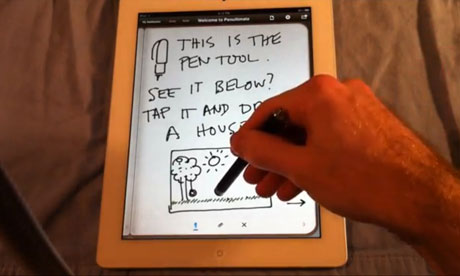The late author's beloved Moleskine seems to be having a profound influence on its tablet computer-based cousins

Apps such as Penultimate mimic many of the features of the Moleskine notebook.
Bruce Chatwin has a lot to answer for. Specifically, he's responsible for a forthcoming initial public offering (IPO) on the Italian stock market. It all goes back to something he wrote in his book The Songlines. He had arrived in Australia and was setting up a work space in a caravan. "With the obsessive neatness that goes with the beginning of a project," he wrote, "I made three neat stacks of my 'Paris' notebooks. In France, these notebooks are known as carnets moleskines: 'moleskine', in this case, being its black oilcloth binding. Each time I went to Paris, I would buy a fresh supply from a papeterie in the Rue de l'Ancienne-Comédie."
Chatwin goes on to relate how the notebooks were made by a small firm in Tours, the owner of which had died and whose heirs had sold the business. So he assumed that the source of his beloved notebooks had dried up. What he didn't know was that the business had been bought by a Milanese stationer who eventually began producing the notebooks again. And what he could not have known was that the business would one day be floated on the stock market (3 April, to be precise). The IPO could value cthe company at up to €560m (£473m).
Regular users of its products will find the information in the pre-IPO filings interesting. The price of a Moleskine notebook, for example, is at least double that of comparable products, which is why the company enjoys an operating margin – 41.7% – that would impress even the boys and girls at Apple. The explanation, of course, is that the basic ingredient of a Moleskine notebook – paper – is dirt cheap. (And it shows – as fountain-pen users discover very quickly.)
The reason Moleskine gets away with charging so much for such an indifferent artefact is that is it not so much selling a product as an ethos. Call it the Chatwin syndrome: the delusion that possessing the kind of notebook that Hemingway, Oscar Wilde or Picasso might have used bestows elan, panache and other desirable qualities upon the proud owner. And – who knows? – maybe they're right.
More
Chatwin goes on to relate how the notebooks were made by a small firm in Tours, the owner of which had died and whose heirs had sold the business. So he assumed that the source of his beloved notebooks had dried up. What he didn't know was that the business had been bought by a Milanese stationer who eventually began producing the notebooks again. And what he could not have known was that the business would one day be floated on the stock market (3 April, to be precise). The IPO could value cthe company at up to €560m (£473m).
Regular users of its products will find the information in the pre-IPO filings interesting. The price of a Moleskine notebook, for example, is at least double that of comparable products, which is why the company enjoys an operating margin – 41.7% – that would impress even the boys and girls at Apple. The explanation, of course, is that the basic ingredient of a Moleskine notebook – paper – is dirt cheap. (And it shows – as fountain-pen users discover very quickly.)
The reason Moleskine gets away with charging so much for such an indifferent artefact is that is it not so much selling a product as an ethos. Call it the Chatwin syndrome: the delusion that possessing the kind of notebook that Hemingway, Oscar Wilde or Picasso might have used bestows elan, panache and other desirable qualities upon the proud owner. And – who knows? – maybe they're right.
More

No comments:
Post a Comment